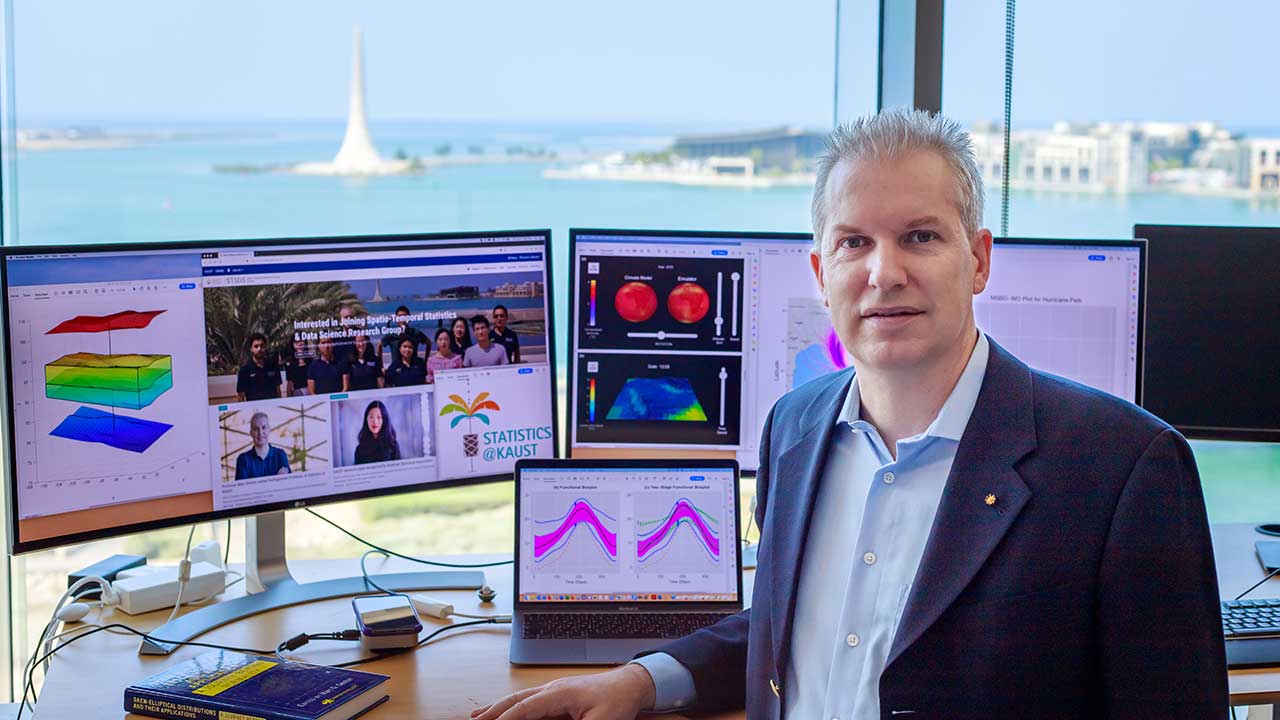Professor Marc Genton receives Don Owen Award

Professor Marc Genton received the prestigious 2024 Don Owen Award at the 43rd Annual Conference of Texas Statisticians.
The San Antonio Chapter of the American Statistical Association (ASA) has selected Al-Khawarizmi Distinguished Professor of Statistics Marc Genton as the recipient of the prestigious 2024 Don Owen Award.
According to the San Antonio Chapter of the ASA, the Don Owen Award — a highly regarded recognition in the statistical community — is granted to a statistician “who embodies the three-fold accomplishments of Dr. Donald B. Owen.” Owen was a Distinguished Professor of Statistics at Southern Methodist University, Dallas, U.S., whose illustrious career “serves as the standard against which nominees are evaluated for excellence in research, statistical consultation and service to the statistical community.”
Professor Genton received the award at the 43rd Annual Conference of Texas Statisticians (COTS). The conference took place in Houston, U.S., from May 9–10, 2024, and focused on the theme of "AI, Machine Learning and Other Related Statistical Techniques with Applications."
“I am deeply honored to receive the 2024 Don Owen Award, especially given the caliber of past recipients, including eminent statisticians such as Emanuel Parzen, Raymond J. Carroll, James A. Calvin and Dipak K. Dey, to name but a few,” said Genton of his accolade.
Professor Genton’s pioneering research on large-scale spatial and temporal data has profoundly affected the field of environmental statistics. He is an expert in spatial and spatio-temporal statistics with applications to environmental problems, in the Kingdom and beyond. For instance, he led an in-depth five-year study of wind energy potential in Saudi Arabia, culminating in a comprehensive plan for developing the Kingdom’s future wind energy strategy.
Using apps and 3-D glasses, he has also demonstrated how virtual reality can help visualize environmental data on smartphones.
His current research focuses on developing high-performance computing tools for spatial statistics and expanding the capabilities of ExaGeoStat, the software developed by his Spatio-Temporal Statistics and Data Science (STSDS) research group and the Extreme Computing Research Center (ECRC).
The Distinguished Professor of the KAUST Statistics Program’s work has revolutionized environmental data science on large-scale problems of spatial and temporal datasets. To emulate climate model outputs of more than one billion temperature data points, he developed 3-D space-time stochastic generators using spectral methods and fast Fourier transforms.
He is a Fellow of the ASA, the Institute of Mathematical Statistics (IMS), the American Association for the Advancement of Science (AAAS), and an elected member of the International Statistical Institute (ISI).
In addition to the Don Owen Award, Genton has received numerous other prestigious accolades, including the El-Shaarawi Award for Excellence from the International Environmetrics Society (TIES) and the Distinguished Achievement Award from the Section on Statistics and the Environment (ENVR) of the ASA. In 2017, he received the Wilcoxon Award for Best Applications Paper in the journal Technometrics. He also received an ISI Service Award in 2019 and the Georges Matheron Lectureship Award in 2020 from the International Association for Mathematical Geosciences (IAMG).
He led a Gordon Bell Prize finalist team with the ExaGeoStat software for Super Computing 2022. He was also awarded the Royal Statistical Society’s (RSS) 2023 Barnett Award for his outstanding contributions to environmental statistics.
In addition to his over 300 publications, Genton has edited a book on skew-elliptical distributions and their applications. He has given over 400 presentations at conferences and universities worldwide.
Before joining KAUST, he held prominent faculty positions at the Massachusetts Institute of Technology (MIT), U.S.; North Carolina State University, U.S.; the University of Geneva, Switzerland; and Texas A&M University, U.S. He received his Ph.D. in Statistics ('96) from the Swiss Federal Institute of Technology in Lausanne (EPFL), Switzerland. He also holds an M.S. degree in Applied Mathematics Teaching ('94) from EPFL.

